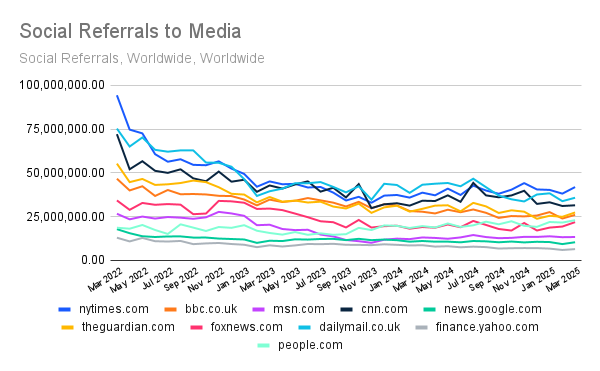
Facebook traffic appears to be a growing part of the social pie again at three-quarters of the world’s biggest news websites.
The pattern can also be seen in the US, where the Facebook share of total social referral traffic was up at 74% of the biggest sites in March compared to one year earlier.
New Similarweb data shared with Press Gazette appears to confirm the trend noted by multiple major publishers so far this year that Facebook traffic is on the up following a drastic downturn.
In May last year Press Gazette found that referral traffic from Facebook to news publishers was down 50% in a year after the platform deprioritised news links and was more likely to highlight videos.
But in January this year Meta said it “will take a more personalised approach to political content, so that people who want to see more of it in their feeds can” across Facebook, Instagram and Threads, resulting in more news content appearing.
Similarweb data estimating Facebook’s share of total social referral traffic in March 2024 versus 2025 appears to confirm the change in strategy is having a positive effect on many of the biggest news websites.
The share of total desktop social referral traffic coming from Facebook increased at 75% of the 68 biggest news websites in the world in March.
The Similarweb and Press Gazette analysis excludes from the top 100 news websites in the world any non-English-language brands and those without year-on-year data that we could compare.
Overall social referrals on desktop and mobile web traffic increased year on year at 48% of the 68 websites.
Some 37% of sites saw both the Facebook share and total social referral traffic increase, perhaps the best indicator of total improvement attributable to Facebook.
One of the biggest winners was the Express, which saw Facebook grow as a referrer of social traffic by 26% in the past year. Facebook made up 75% of all social traffic to the Express in March. In addition total social referrals to the Express grew by 68%.
Several US-based political and hard news sites also saw growth by both metrics, suggesting an increase in their actual Facebook traffic: The Atlantic, Axios, The Hill, Reuters, Newsweek, Breitbart, ABC News and the Associated Press. Substack was also on this list.
Digiday reported last week that Newsweek’s Facebook referral traffic quadrupled in March compared to the same month in 2024, with a particular boost from political and economic stories. Meanwhile one publishing executive, kept anonymous, told an event in March that Facebook revenue and referral traffic were up about 30% compared to their lowest point which was in November last year.
The Express had the biggest proportion of its social traffic coming from Facebook. The other sites with more than 50% coming from the platform were: India.com (63%), Buzzfeed (61%), Express sister title the Mirror (60%), Newsbreak (58%), The Sun (57%), Indian site ETV Bharat (56%), Breitbart (54%) and news.com.au (52%).
Despite the apparent Facebook gains at some sites, total social referrals were down year on year at six of the ten biggest news websites in the world in March (though all were up month on month). The biggest annual growth was at People.com, up 17%, while the biggest drop among the biggest sites was at Yahoo Finance (down 26%).
And any recent uptick in Facebook traffic has not changed the decline in social referrals since 2022 for some sites. Global social traffic for The New York Times and CNN were each down 56% since March 2022 (to 41.9 million and 31.5 million respectively) while Mail Online was down 52% (to 35.8 million) and The Guardian was down by 50% (to 27.4 million).

US traffic data shows similar pattern of Facebook share growth
In the US, Facebook as a share of social traffic on desktop was similarly up by 74% among 94 sites analysed.
More sites have seen year-on-year growth in total social referrals across desktop and web in the US compared to globally: 57% of the sample had higher social traffic in March than a year earlier.
But just under half (45%) of the biggest US sites saw percentage growth in both Facebook share and total social media referrals.
The biggest winners across both metrics were: Vogue (with Facebook share up 25% and total social referrals up 32%), MSNBC, Seattle Times, Breitbart, Forbes, ABC News, Blaze Media and Syracuse.com.
But in the case of The Epoch Times, a bigger share of social referrals came from Facebook but the total volume of social referrals was down, suggesting it did not see the same growth.
The sites with the biggest reliance on Facebook for social traffic in March were: conservative sites Blaze Media (91%), Newsmax (74%) and the Daily Wire (71%) as well as local newsbrand Syracuse.com (77%).
Although the Mirror worldwide had a strong base of Facebook referral traffic, the Mirror’s URL for its American audience which launched in 2023 got just 7% of its social traffic from the platform in March.
Other sites with a low reliance on Facebook for social traffic in the US included Newsweek (10% of social traffic), Politico (9%), The Independent (7%), The Verge (7%), conservative news aggregator Citizen Free Press (6%), Bloomberg (6%), The New Republic (5%), Zero Hedge (3%), Thomson Reuters (1%) and Patriots.win (zero).
Anecdotally, Press Gazette has heard multiple news sites have also seen growth in traffic coming from Threads for the first time in recent months – although referrals from the platform generally remain much smaller than those from Facebook.
Previously, although Threads accepted that politics and hard news content were “inevitably going to show up”, the platform did not “do anything to encourage those verticals”, head of Instagram Adam Mosseri said in 2023.
But in January this year, when it was announced that Instagram and Threads users would start to be shown political content from accounts they do not follow, Mosseri said it had become clear that people do want to see this type of content and that “it’s proven impractical to draw a red line around what is and is not political content”.
Email pged@pressgazette.co.uk to point out mistakes, provide story tips or send in a letter for publication on our "Letters Page" blog

